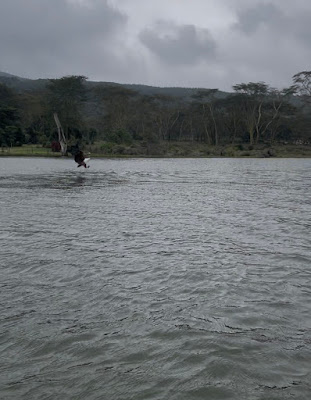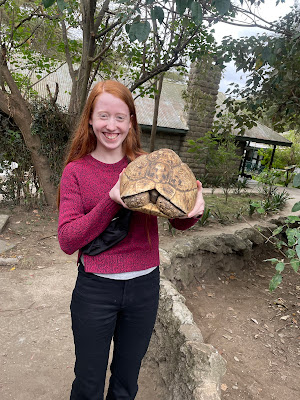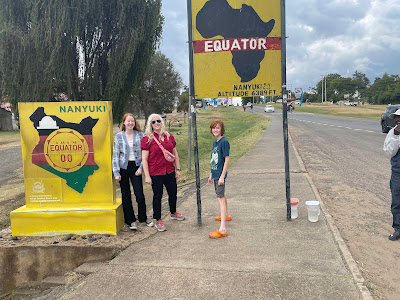And yes, we saw hippos--lots of them. (apparently at night they come right up to Elsamere to graze) but we didn't get super close. We could hear them. They sound kind of like large pigs. The boat driver also fed fish to a couple of fish eagles while we were out on the lake. It was pretty spectacular.
Since 2020, the lake has risen 3 meters. It was pretty amazing to see how much land was lost. There used to be a much smaller lake next to Naivasha lake. In fact, if you look it up on a map, it will probably still show that, but now the lakes have joined. There are a bunch of dead acacia trees in the water.
In other areas there are half submerged sheds. Fun fact: although countries like Kenya contribute very little to greenhouse gases and other environmental damage, the effects hit much harder here. Okay, that wasn't a very fun fact. When we got back we finished the documentary and sat outside watching columbo monkeys in the trees around us. They are fascinating to us, but they are pests to the people that have to deal with them. Columbo monkeys remind me of skunks.
We were given a nature tour of the property before we left. We warthogs grazing, the poo of various animals--from zebras to hippos to dik-diks, (dik-diks are tiny antelopes that are only 30-40 centimeters tall). We also got to hold a tortoise. It was surprisingly heavy. They are very dense.
The other big thing of note is that we left Nairobi for a couple weeks and have come to Nanyuki. And to do this we crossed the equator--barely.
The city is pretty much right on the equator. But it isn't hot here. In fact it is a little cool. In Nanyuki we are staying at a house. There is a lady here that has a little compound and she rents little cabins out to interns. However, the kids and I are in the main house with her. It is a little awkward, but it is also a pretty cool experience. There are some students here from the Netherlands who are also interning at the same place I will be working. The house is super old, but we are comfortable. There is a girl who cooks and cleans, so we have been eating more authentic Kenyan food. There is a tiny kitty here who just always wants to be held and 4 or 5 dogs. Those things make the reds happy. They are always cuddling the kitty. Except now they are worried it has fleas because Lizzie has a bunch of bites on her legs and ankles.
The city is pretty much right on the equator. But it isn't hot here. In fact it is a little cool. In Nanyuki we are staying at a house. There is a lady here that has a little compound and she rents little cabins out to interns. However, the kids and I are in the main house with her. It is a little awkward, but it is also a pretty cool experience. There are some students here from the Netherlands who are also interning at the same place I will be working. The house is super old, but we are comfortable. There is a girl who cooks and cleans, so we have been eating more authentic Kenyan food. There is a tiny kitty here who just always wants to be held and 4 or 5 dogs. Those things make the reds happy. They are always cuddling the kitty. Except now they are worried it has fleas because Lizzie has a bunch of bites on her legs and ankles.
Here I'll be working with an Indigenous organization, helping them to apply for a grant with the Canadian government in partnership with a Canadian Indigenous group. My first big task is to figure out who the partner will be. I think it will probably be the Stolo people because that is what is near UFV. The leader of the organization here saw my CV and saw that I have experience in agroecology and also wants me to work with Twala, a women's cooperative north of here that grows aloe vera. I hope I get to see them. I don't know how much help I'll be as all my experience is in a growing in a temperate rainforest, but it sounds very cool. I just finished talking to the person who oversees interns. She wanted me to go "in the field" with her. Which means travelling around going to more remote areas for a week and meeting with different Indigenous groups. As I can't go off and leave the kids alone here for a week, they will arrange for us to go to more local groups. I'm excited.












1 comment:
Very cool!
For clarity- ‘the boat driver’ feeding the eagle was Malachi.
Post a Comment